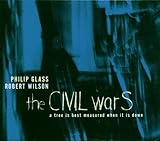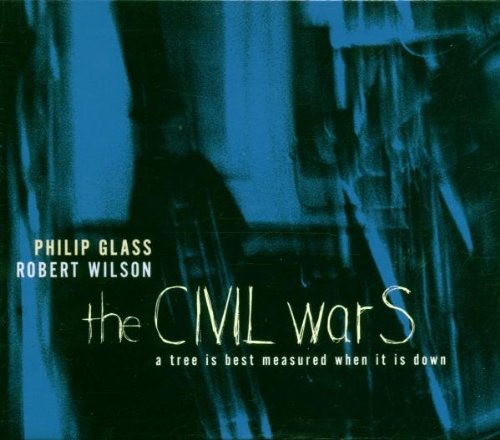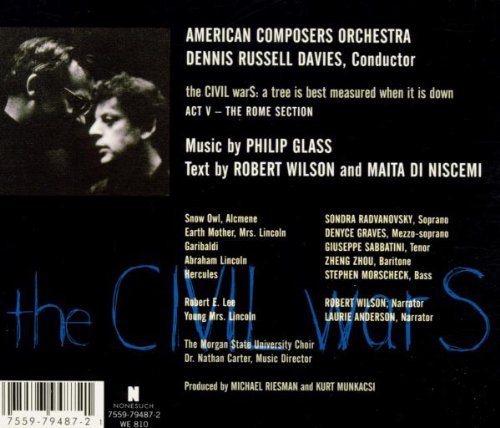Philip Glass Album: «Glass: The Civil Wars - A Tree is Best Measured When it is Down»

- Customers rating: (4.4 of 5)
- Title:Glass: The Civil Wars - A Tree is Best Measured When it is Down
- Release date:1999-05-18
- Type:Audio CD
- Label:Nonesuch
- UPC:075597948721
- Average (4.4 of 5)(16 votes)
- .10 votes
- .4 votes
- .1 vote
- .1 vote
- .0 votes
- 1Act V -The Rome Selection: Prologue
- 2Act V -The Rome Selection: Scene A
- 3Act V -The Rome Selection: Scene B
- 4Act V -The Rome Selection: Scene C
I first encountered Philip Glass when I saw a trailer for the film "Koyannisqatsi" years and years ago, at the Vallhalla Theatre in Sydney, Australia. I was like a rabbit in the headlights when the first notes of the organ struck. To a large extent, nothing has changed since then. I still listen to everything the man produces but take rather a lot of care to not let minutae and pedantry get in the way of the impact of the music. In this way, I suppose, I prefer "Akhnaten" to "Music In Twelve Parts" and "Einstein on the Beach" to "1000 Aeroplanes on the Roof." Now that you have a clue where I am coming from...
I think that "The Civil Wars" is easily the best thing that Philip Glass has ever made. It has the emotional impact of "Akhnaten" and "Einstein" the philosophy behind "Satyagraha" and the music is consistently as beautiful as the best parts of those operas, but is condensed into an astonishingly short (chronological) time frame. By this I mean that I will happily listen to "CIvil Wars" right through, in one sitting, and find when it finishes that I feel like I have been away from my life for weeks or months and that I have learnt things that I will never be able to put into words.
To say that i think that it is "good" would be a thorough-going understatement. I laugh out loud occasionally during it and usually, at other points, I cry. I have listened to it about once a month every month or so since 1999 and I would be hard put to tell you which bits are "funny" or why I cry. The music is like a dream, which enfolds me while I listen to it, and then fades as normal life reasserts itself.
As far as I am concerned, this is the best of all Philip Glass' works and that means that while it is definitely not for everyone, it is the best, of the very, very, best.
Contrary to what one reviewer said, when Glass wrote this opera, it still was the 80's. 1984 to be precise. The narration is slightly annoying, if you are purely interested in the music, but it wasn't meant to be just another opera either. This opera is, I believe, more Robert Wilson, the librettest, than Philip Glass. This was Wilson's dream opera, and Glass stepped in to fill the role of composer. The narration parts, like Einstein, are Wilson's touch. I thought I would clarify that from the earlier review.
This music does sound like typical Glass, though. I had already purchased his Symphony No. 5, and that is what this opera reminded me most of, although Symphony No. 5 was written after The Civil warS. If you are familiar with Koyaanisqatsi, The Photographer or Ahknaten, this opera comes from the same time period in Glass's developement. This happens to be my favorite time period of his work, so I was thrilled when I first heard the music.
Mostly the work is a series of repeating major and minor arpeggios with changing tonal center and orchestration. Although this sounds simple, it is anything but. It stays fresh the whole time, and if you are like me, when it does finally end, you are left wanting more and more repetition, not because Glass didn't offer enough, but because the repetitions become so addictive.
I highly recommend this for any Glass fan who wants to get a closer look at Glass's operas without having to pay for any of his other pricier ones.
I'm afraid I am biased in two ways. First, I am a long time fan of Glass' music. Second, I have lived with an aircheck recording of the broadcast of the Los Angeles premiere performance of 1984.
It is indeed a shame that Robert Wilson's magnum opus CIVIL warS (sp?) was not performed in its entirety as originally intended. It featured operas by several composers from various countries and was to have been performed complete at the 1984 Olympics.
The work at hand is, I believe, the concluding section of the entire work. Glass did another section for Cologne, Germany which has yet to be recorded.
After repeated listenings over the years I became entranced by the grand mythical quality of the work. It has the most effective use of voice-over techniques since "Einstein" and the choral, solo and orchestral writing show Glass at his peak with this work a contemporary of Satyaraha, Akhnaten, Itaipu, etc. This is a lush, romantic work with a grand sweep and shows Glass' ability to write for musicians other than those trained in his ensemble.
That said I have had difficulty adjusting to the (authentic and viable) but markedly different performance style of this recording. Dennis Russel Davies, a long time Glass promoter, does a fine job of conducting but the voice overs by Robert Wilson and Laurie Anderson took some getting used to. This is not so much a criticism as it is a statement of the uniquenes of every performance.
What I truly longed for and did not get was Jessye Norman. The mezzo part was originally written with her in mind and I can only imagine the beauty and sweep her talent would have added to Glass' bold octave leaps particularly in part A.
Overall a well done recording which improves with repeated listenings.
While the expansive Einstein on the Beach has some truly amazing moments, and I cherish my copies of Akhnaten and Satyagraha, it's the relatively short 'The Civil Wars' that gets the most play. It contains what I believe are some of the most achingly beautiful vocal & instrumental harmonies I've had the pleasure of experiencing. And I LOVE Robert Wilson's cameo, as he playfully explores the mechanics of speech; dissecting sounds and words, turning them over, rearranging them, exposing their limits. Wilson had a speech impediment as a youth, and language (like everything else in his work) takes on special significance. It's too bad this project was never fully realized.
In my opinion, this is Glass's most beautiful opera. His others are filled with nervous and akward repetitions on electronic instruments. But, "CIVIL warS- a tree is best measured when it is down" flows with slow, romantic repititions in the strings, with occassional, mournful lilts in the bassoons and soft calls of the French horns. However, this is only the American Composer Orchestra's interpretation. The Stuttgart Chamber Orchestra's version of the CIVIL warS interludes is on Glass's Symphony no. 3 recording.


